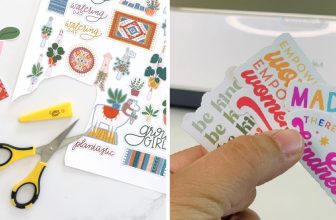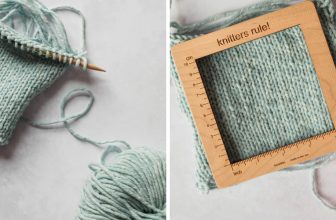How to Clean Unsealed Brick Floors
If you want to maintain a clean and long-lasting brick floor, this blog post is for you! Brick floors are attractive and durable but can be difficult to keep clean. This blog post will provide you with information on how to clean unsealed brick floors in order to keep them looking their best.
Cleaning unsealed brick floors can be a daunting task. Therefore, it is important to know the different methods of cleaning, as well as how to maintain your flooring for continued protection against dirt and stains. Read this full blog post to know how to properly care for your unsealed brick floor so that it lasts longer than ever before.
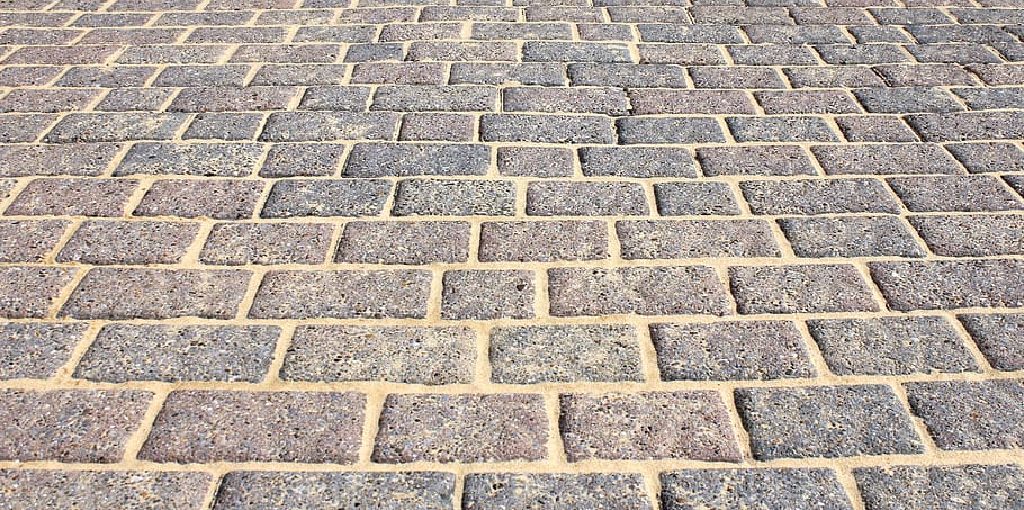
Why You Should Clean Unsealed Brick Floors?
1. Dirt buildup will cause the floors to appear dull over time.
2. Dirty unsealed brick floors can pose a safety hazard for children and pets, who may play on the floor.
3. People with allergies are more likely to have an allergic reaction, or their symptoms will worsen after exposure to allergens found in dirt or dust.
4. A clean floor is always more appealing than a dirty one – whether you’re trying to impress potential buyers or renters, or just want your home or office to look its best.
5. If you have allergies or asthma, it could improve the condition by removing irritants from your environment and/or work environment.
6. If you have pets, a clean floor is easier to keep pet hair and dander off of than a dirty floor.
7. A clean home or office simply looks more comfortable and pleasant than a messy-looking space that needs to be cleaned up constantly.
8. Cleaning your unsealed brick floors can help prolong the life of your floors.
What You Will Need to Clean Unsealed Brick Floors:
- A screwdriver or hammer and a chisel
- Rubber gloves
- A bucket filled with clean water
- Sponge mop or microfiber mop pad
- Woodgrain scrubber for tough dirt
- Biodegradable soap or environmentally safe cleaning solution
- Clean water in a bucket
Steps To Follow: How to Clean Unsealed Brick Floors
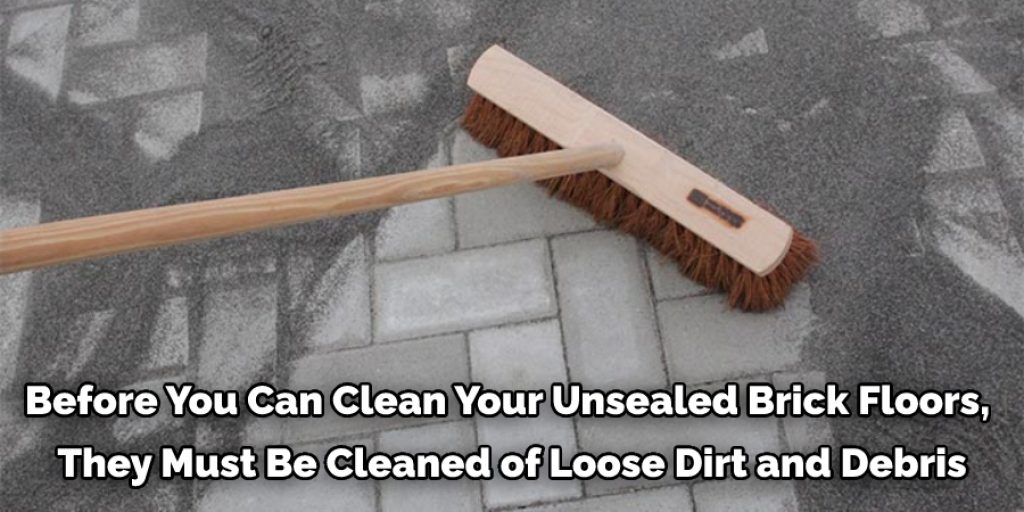
Here are the steps if you want to know how to clean unsealed brick floors.
Step 1: Sweep, Mop, or Vacuum
Before cleaning your unsealed brick floors must be cleaned of loose dirt and debris such as dust, hair, and pet dander. Sweep, mop, or vacuum the floor thoroughly to remove all loose dirt. This will keep these surface contaminates from re-sticking back on the floor after cleaning it.
Step 2: Spray the Floor with Water
After you have swept, mopped, or vacuumed the loose dirt off your unsealed brick floors, spray them thoroughly to wet the surface. This will give the cleaning solution something to adhere to while scrubbing into the grout lines of your floor. If you don’t rinse away the loose dirt first, some of it may re-stick to the floor surface after you have rinsed.
Step 3: Apply Unsealed Floor Cleaner
After spraying down your unsealed brick floors with water, apply an unsealed floor cleaner on top of them. There are many cleaners available for use on unsealed brick floors, but the simplest to use is either a 1:3 dilution of white vinegar and water or a mixture of equal parts hot water and bleach. Read the label directions for proper application before using any cleaner on your floor.
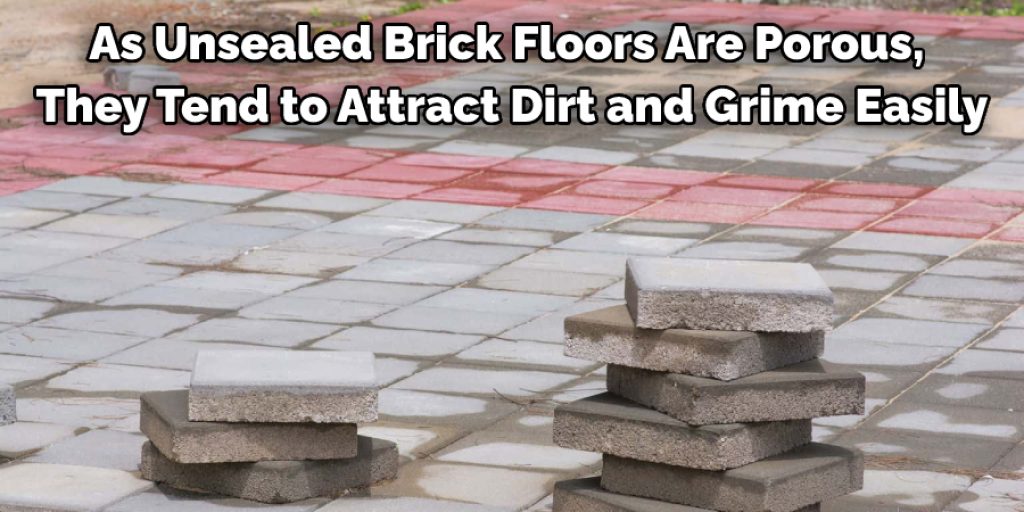
Step 4: Scrub Grout Lines with Cleaning Brush
Using a strong bristled brush, such as a scrubbing brush or a toothbrush, scrub each grout line thoroughly. This will allow the cleaning solution to work deep down into the crevices of your brick floor and break up any dirt or stains that have accumulated in them over time.
Step 5: Rinse Cleaning Solution from Floor
When you are finished scrubbing, spray down your floor with clean water. This will rinse the cleaning solution from the brick floor and flush it away with any loose contaminants you have cleaned up.
Step 6: Dry the Floor
When your floor is completely rinsed, you can either let it air dry for a few hours or use a towel to soak up any excess moisture. Air drying may take longer but will not leave wet spots on the brick floor where water could stain and damage them.
Some Tips and Suggestions:
1) Unsealed brick floors were never sealed, so using harsh cleaners can damage the actual brick. If you do not want to use water, you should try dry cleaning instead of wet cleaning. This makes it easier to clean up any residue. You just need to sweep or vacuum any dust that results from the cleaning.
2) As unsealed brick floors are porous, they tend to attract dirt and grime easily. So, don’t use a broom or vacuum, pushing it around further until it gets trapped in corners. Instead, use a dust mop with soft bristles to clean your floor really well.
3) You should not pour a lot of water on your floor. Just dampen the mop with clean water or even better-distilled water if possible, which is less harsh and can help reduce mineral deposits from hard water. It also helps keep the brick’s pores open so it can easily accept any cleaning solution you use.
4) Use a good quality broom or mop to sweep the floor really well before you start mopping with water and detergent. This will help remove any loose dirt and debris that can scratch the surface of your unsealed brick floor.
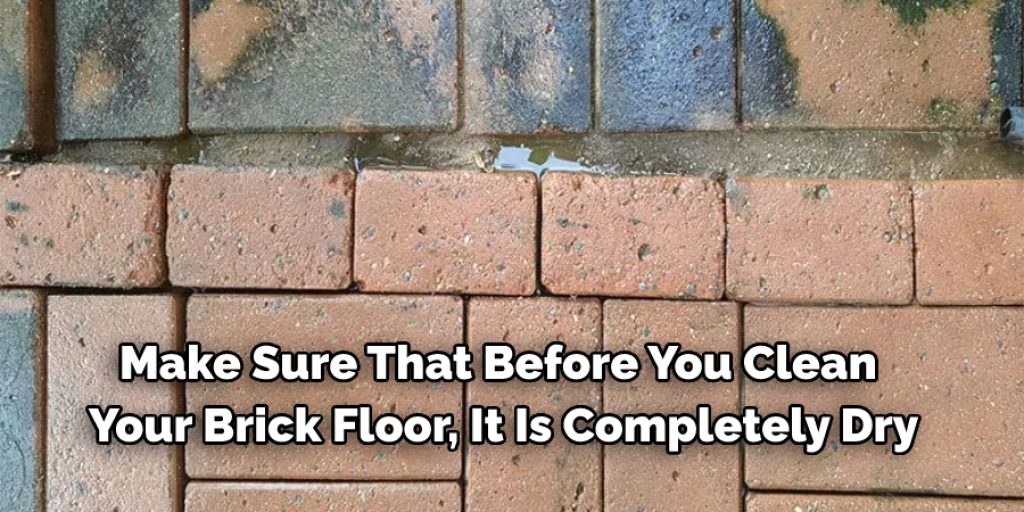
5) Prepare a bucket or pail of clean, distilled water with some gentle cleaning solution like phosphoric acid. Make sure to run your mop under tap water before wringing it out, and this will prevent any streaks or lines of soil on your floor that can come from dirty, still-soapy water.
Cautions for Cleaning Unsealed Brick Floors:
When cleaning your unsealed brick floors, there are a few guidelines to be followed that will help you clean unsealed brick floors.
1. First, make sure that whatever cleaning solution you choose does not contain any harsh chemicals or ingredients that could corrode the surface of the brick. Vinegar, bleach, and water are all good potential cleaners for unsealed brick floors.
2. Secondly, if your floor is installed over a concrete foundation that is not sealed either, do not use bleach or vinegar as it will cause the acid to eat away at the foundation and damage it. If you have any concerns about what your cleaning agent may be doing to your floor, test it first in an inconspicuous area.
3. Make sure that it is completely dry before you clean your brick floor.
4. If the surface of the bricks is very dirty or greasy, use a cleaning solution with degreasers in them to cut through buildup on the surface of the bricks.
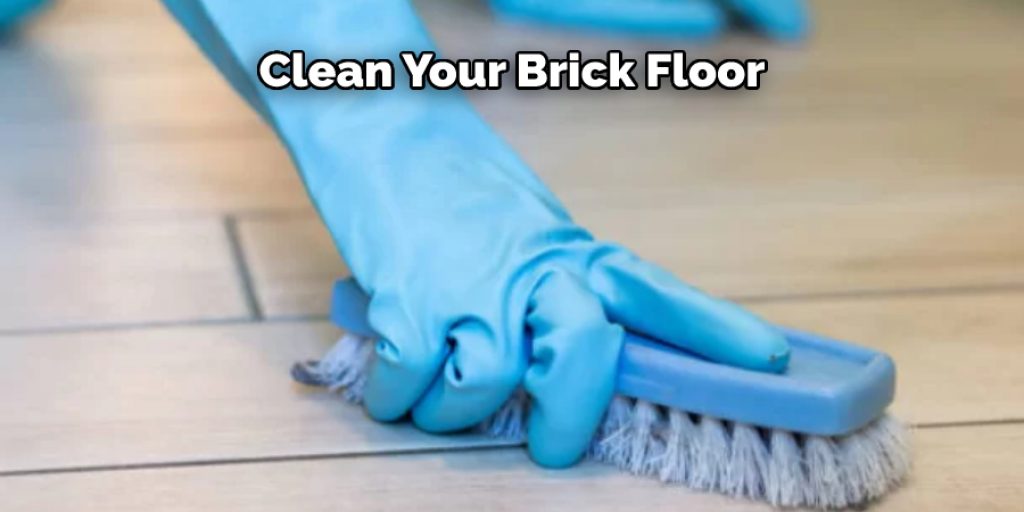
5. Never pour water directly onto the sealed surface of the brick; use some sort of a mop or rag to get water onto the surface of the brick.
6. It is best to start cleaning your brick floor in the corner of the room and work yourself outward so that if anyone spills water or cleaner on the floor, it will not affect your other floors.
7. Lastly, remember that if your brick floor is unsealed, it will not have the glossy shine that sealed floors have. You may see a bit of a matte or rough texture after scrubbing and rinsing away grease and dirt, but this does not mean that you need to reseal your floors as soon as possible.
Five Benefits of Cleaning Unsealed Brick Floors:
1. Cleaning your unsealed brick floors has many benefits. It helps make your house clean and new looking again, it can add value to the area if you are selling (or renting), and some people even like how it smells afterward!
2. Not only that, but if done incorrectly, it could damage your flooring and cost you more money in repairs.
3. When finished, your floor should look like nothing ever happened to it! Now you can see those beautiful maroon bricks shining through again, rather than the dull, faded floor from lack of care.
4. A clean floor also gives you another thing to show off when house-hunting or when people come over.
5. It is not hard to do at all! All you need are some simple products and tools, and in just a short time, your brick floors will look better than ever.
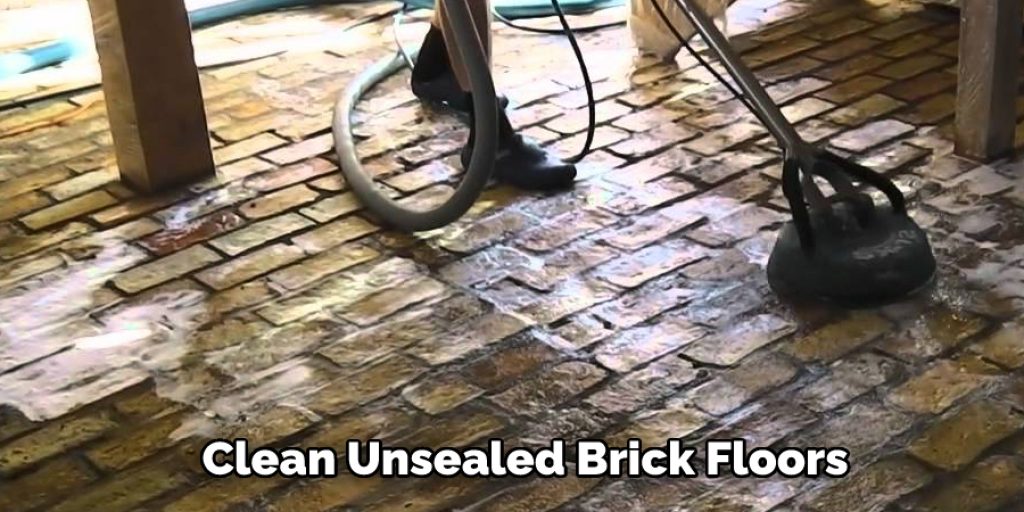
Frequently Asked Question
Will Vinegar Damage Bricks?
There is some debate about whether Vinegar will damage bricks, but the general consensus is that it probably won’t. Vinegar is a natural cleaner and sanitizer that is commonly used to clean surfaces such as stainless steel and glass. While Vinegar may cause some mild damage to brick surfaces, it is not likely to cause any major problems. If you do notice any damage, you can try using a different cleaner or sanitizer to see if that solves the issue.
Does Bleach Discolor Brick?
Bleach can damage brick if it is used improperly or if the brick is not properly sealed. When bleach is applied to a brick surface, it dissolves the water-soluble components of the brick. This leaves behind a white film on the surface that can conduct heat and damage the brick. Additionally, bleach can also discolor bricks over time. This occurs when the white film forms a protective barrier that blocks the absorption of other colors in the brick. This can lead to a yellow, brown, or green hue on the surface of the brick.
Does Simple Green Clean Brick?
Yes, Simple Green Clean Brick is a powerful all-in-one cleaner that can help clean almost anything. It is perfect for cleaning bathrooms, kitchens, floors, and more. Simply fill the cleaner with the amount of water you need, and then follow the instructions on the bottle. The cleaner is safe to use on all surfaces, and it is also environmentally friendly.
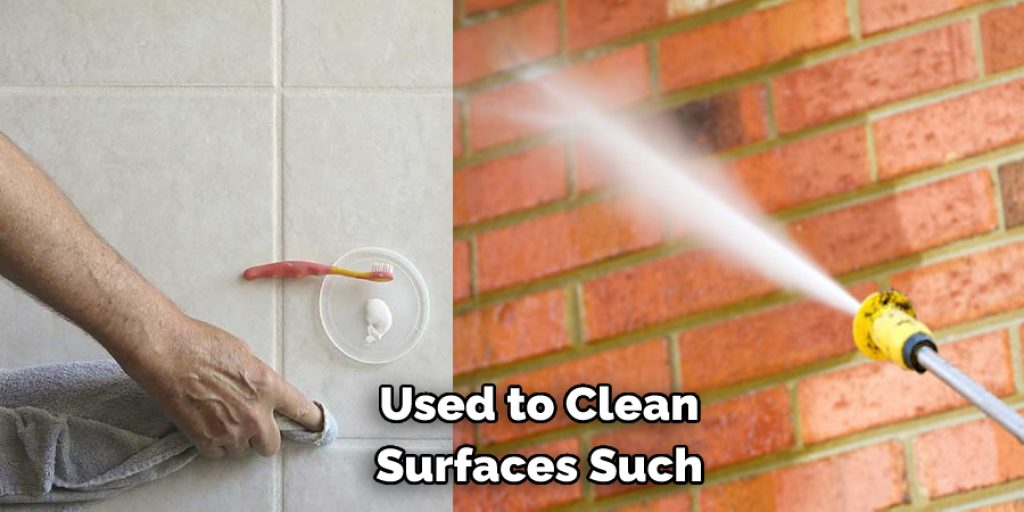
Simple Green Clean Brick is a great choice for anyone who wants a powerful cleaner that is safe to use and easy to use.
Conclusion:
Brick floors are an attractive addition to any room, but they can be quite difficult to maintain. The best way to keep unsealed brick floors is looking their best is by cleaning them regularly with a suitable sealant or polish. Regular cleanings will also help prevent dirt and other debris from building up on the surface of your bricks which could lead to discoloration in time.
If you have never polished unsealed brick before, there are some easy steps mentioned on how to clean unsealed brick floors that should get you started! Always follow the manufacturer’s instructions for application and maintenance to ensure your sealed brick floors are safe from damage. Contact us today for more information on how we can help with professional services!
You May Also Read – How to Clean Up Concrete Dust



